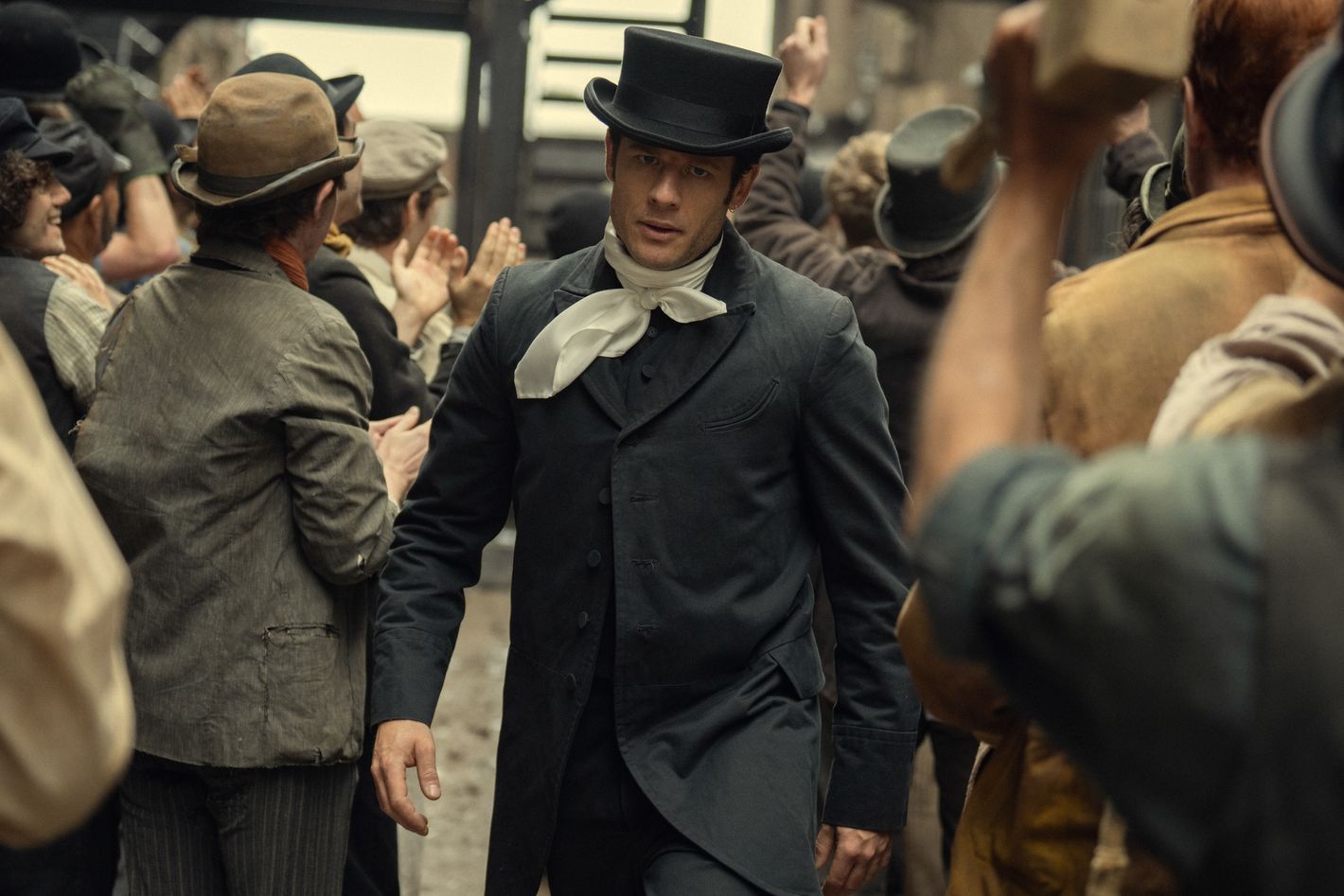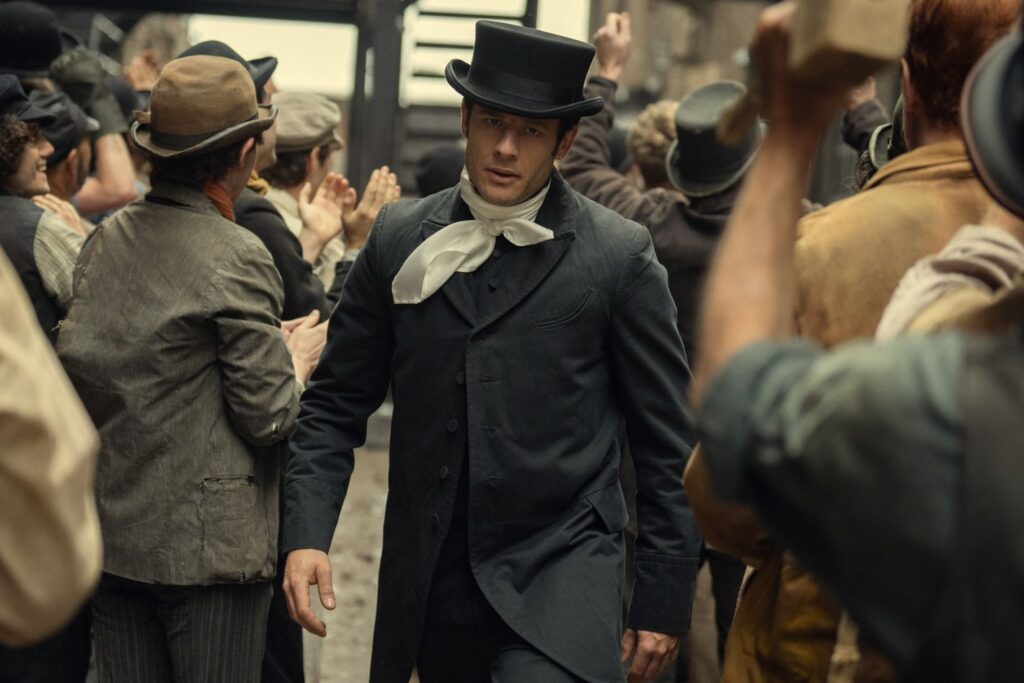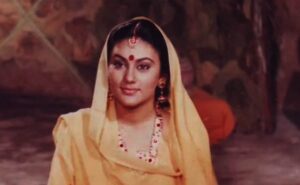
The opening minutes of House of Guinness are a collage of some of the most typically Steven Knight things ever put onscreen. If you’re familiar with the prolific British writer’s fondness for grimy historical dramas embellished with as much street brawling as possible, you may be able to envision the tone. The Netflix drama launches into its tale by cutting between preparations for the funeral of Sir Benjamin Lee Guinness, much-beloved patriarch of the famous Irish brewery, and a demonstration outside its gates against the dangers of inebriation — though only after a disclaimer promising that the show, set in 1868, is a fiction “inspired by true stories,” and a series of action shots of the actual brewing process set to a thrumming electric bass, with the ingredients “WATER, MALTED BARLEY, HOPS, YEAST” punching into the screen in all-caps gothic lettering. Soon, the show introduces the Guinness family enforcer Sean Rafferty, a steely and strong-jawed James Norton, who’s assembling his men to tamp down on the protestors. Will there be trouble when they confront the religious zealots who’ve set up an effigy of the late Guinness as part of their protest? “The family’s name is Guinness,” Rafferty sneers, “of course there’ll be fucking trouble.” Cue the title card: A shot of a beer bottle smashing into the House of Guinness logo, all set over an electric fiddle riff, naturally.
The rollicking mode established by House of Guinness’s opening is very much of a piece with the rest of Knight’s career. This show may as well be a prequel to Peaky Blinders, his smash-hit saga of Irish gangsters in Birmingham, except set a half-century earlier and across the ocean in Dublin proper. Beer brewing also happens to be more of a legitimate business than belonging to a gang, though in Knight’s telling, not by that much. Sir Benjamin’s death leaves behind a power vacuum for control of the expanding hops-based empire, and his four children immediately start competing for power. The setup is very much like Succession, which is to say it’s got the classical bones of any good inheritance drama going back through King Lear. Knight cranks out scripts with abandon — he’s on tap to write the next James Bond; he’s also written whiffs like the baffling Serenity — so he can sketch out a conflict efficiently and quickly distills this power struggle down to the two most prominent Guinness sons: Will the brewery go to the dutiful Edward (Louis Partridge) or the peacocking Arthur (Anthony Boyle), who has just come back from living the high life in London? Will it surprise you to learn that both have their secrets? Edward is entangled in a romantic relationship with a woman who’s a fierce advocate for Irish home rule. Arthur is intent on hiding his homosexuality, which inevitably complicates his plans to take over his father’s seat in Parliament.
House of Guinness spins out from this moment in the Guinness saga, a cleverly identified bit of real history, into some television-friendly swashbuckling. (Knight is credited as the creator and writer of the series, though the show’s credits note that Ivana Lowell, a descendant of the Guinnesses, is responsible for the original idea.) Knight, as in Peaky Blinders and even his oddball collaboration with Tom Hardy, Taboo, writes material that a certain type of actor clearly loves because it gives them the opportunity to go big and muscular in performance — and yeah, also bearing. Someone like Boyle, who was a standout IRA agitator in Say Nothing, brings a delightful swagger (and a disconcertingly good British accent) to Arthur, even if Knight writes for a gay man in a way that tries so hard to avoid stereotypes of feyness that the character becomes unconvincing, a sort of screenplay version of “no homo.” Partridge matches Boyle with a stoic, though also kind of wormy, good nature as Edward. Norton, meanwhile, is having the time of his life sneering and rolling his eyes at the two younger men who have somehow become his boss. House of Guinness tends to be wise about the ways both business and family are built over an unsteady and ever-changing series of negotiations for power and status. Over the course of eight episodes, the brothers go back and forth between fighting each other and holding together against outside threats, facing down complications that include blackmail from the Fenian Brotherhood, their sister’s well-intentioned but expensive plans for using beer money for charity, and the tricky business of getting Americans hooked on hops.
Knight knows how to pace a show, and House of Guinness is immensely watchable from scene to scene, most of which are launched from one to the other by means of a bit of contemporary rock music. (Kneecap is getting a lot of royalties from this show. Good for them.) But the show’s slick, surface-level approach to a rich and knotty history gets more frustrating with every feint toward thorny questions about the responsibility of capitalists to the labor they employ and exploit. It’s interesting to see how the Guinness heirs think about their responsibility to the Irish working man, especially since Arthur is in favor of British rule, while Edward’s sympathies tend more anti-colonial — largely due to an entanglement with a Fenian agitator played by Niamh McCormack, who gives Jessica Chastain a run for her money in the scene-stealing intense-redhead department. But the show also tends to dispatch these topics with more swagger than depth, like a history teacher who’s worried you’ll get bored if he lingers on anything too tedious.
From its opening moments, House of Guinness is too busy accelerating to go for full immersion. Scenes at a ball or in back rooms tend to race by so Knight can return to the action playing out in the streets, which means there’s not a lot of space to interrogate the various political and social movements characters get involved in. Nor is there much time to ruminate on how all this might relate to any relevant tensions between corporations and colonial enterprises today. Knight just wants you to have fun. The takeaways are surface level: Every time a character mentions a sum of money, text onscreen tells you how much that’s worth in today’s currency. And though the show positions itself as a tell-all, Guinness beer itself gets through without much of a stain. One episode constructs a story around the use of the Irish harp as the brewery’s logo and has the image materialize on the side of a lovingly shot beer can as the kicker image right before House of Guinness cuts to credits. That’s something Steven Knight knows well: You always gotta make sure the brand looks good.
More TV Reviews
Related
Grimy historical family saga House of Guinness pulls out a familiar recipe — with a side of Succession — from Steven Knight.

































































